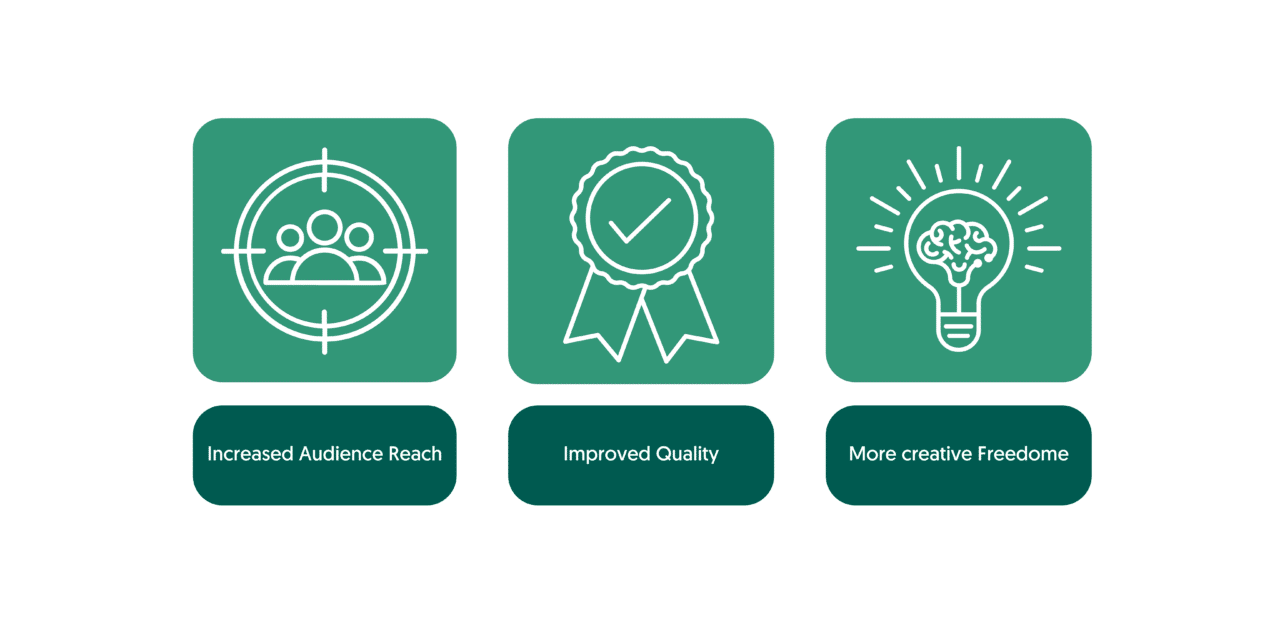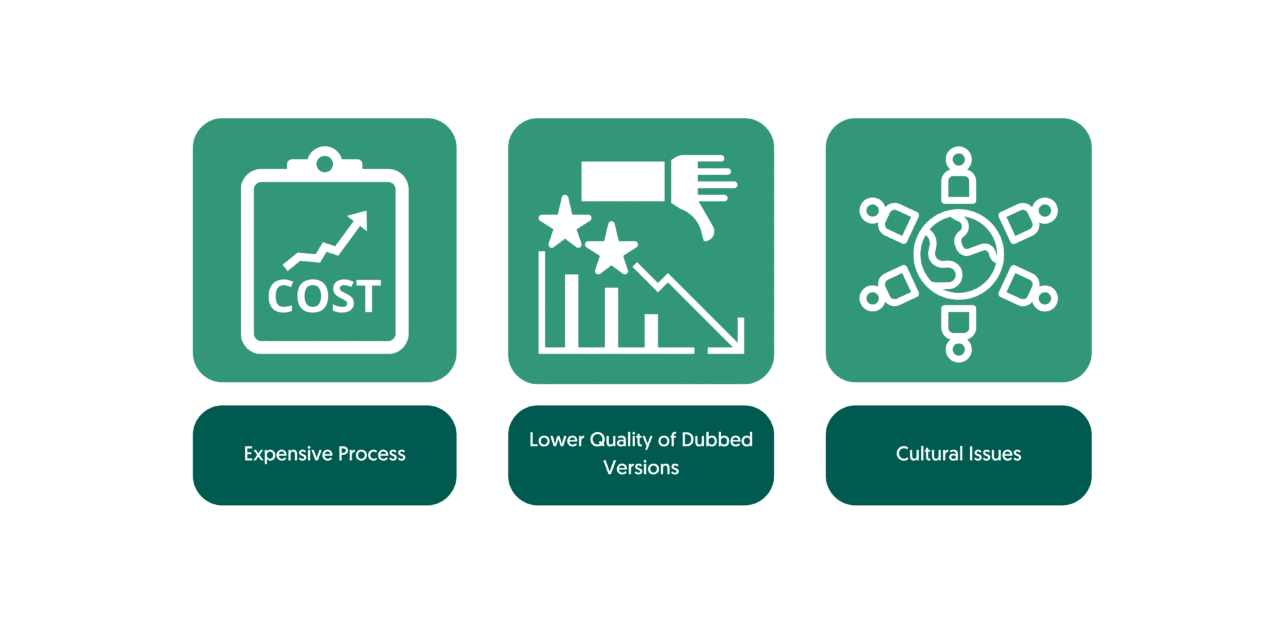Table of content
How does dubbing Impact the Filmmaking Industry?
Dubbing is an important part of the filmmaking process, allowing filmmakers to reach larger audiences and create more engaging content. The process has a variety of effects on the industry, both positive and negative. In this blog post, we will discuss the different benefits and challenges associated with dubbing, potential changes in the filmmaking industry due to dubbing, and the overall impacts of dubbing on the filmmaking industry.

Get started today
Tell us about your dubbing needs
Maximizing Your Reach with Dubbing: What Are The Benefits?
Dubbing can be an extremely advantageous tool for filmmakers, as it enables them to extend the reach of their work far beyond what would normally be achievable. However, there are also some challenges associated with the dubbing process that should not be overlooked. In this section of the blog post, we will discuss the different benefits and challenges of dubbing in detail, and explore how these factors affect the filmmaking industry.

Increased Audience Reach
The main benefit of dubbing is that it allows for increased audience reach. By replacing the audio in a film with another language, filmmakers are able to extend their reach to audiences who may not have been able to watch or understand the original version. This can be helpful for international releases and even films made domestically in countries where there are multiple official languages. Additionally, dubbing can help make films more accessible to non-native speakers or those with limited language proficiency as they are able to understand the content without subtitles. This increased audience reach can also lead to financial gains for filmmakers who may be able to expand their market and increase their profits from international sales.
Improved Quality
Another benefit of dubbing is improved quality. Dubbing can be used to enhance the sound quality of a film, particularly if the original audio was not recorded in an optimal environment or with professional equipment. Moreover, dubbing can help make the content seem more realistic and natural by allowing filmmakers to match lip movements and dialogue more accurately. By dubbing films, filmmakers can ensure that viewers get the best possible experience and have a greater appreciation for their work. This improved quality can also lead to increased audience engagement with the content, as they are more likely to be engaged if they are not distracted by poor sound quality. Furthermore, improved audio quality can also result in an overall better viewing experience for viewers, resulting in higher ratings and greater success for filmmakers.
Finally, dubbing can also help to improve the overall production quality of a film. Dubbed audio is often recorded in a professional studio and processed using advanced sound-editing software, leading to a much better output than what could be achieved with the original audio alone. This means that filmmakers are able to create higher-quality films that look and sound professional while still maintaining their artistic vision. Additionally, the use of professional recording studios can help to reduce background noise and other distractions that might otherwise detract from viewers’ enjoyment. In this way, dubbing can be used to improve a film’s overall production quality, leading to more positive reviews from audiences and greater success for filmmakers.
More Creative Freedom for Filmmakers
Finally, dubbing can also allow more creative freedom when it comes to the addition of music, sound effects, or other auditory elements that may be difficult to add in post-production. By dubbing a film, filmmakers are able to add in these elements without having to re-record the entire audio track. For instance, dubbing allows scenes to be shot in the language that best fits the story or characters, rather than having to use a language that might be better understood by international audiences. This gives directors more freedom to create their films and express stories in ways that would otherwise not have been possible.
Additionally, dubbing can allow filmmakers to create alternate versions or edits of their films for different audiences or markets, something that may not have been possible with the original audio. Dubbing can help filmmakers to nuance stories and add layers of complexity that may have been lost in translation using subtitles. Finally, it also allows for films to be adapted more easily for different countries and cultures without having to recreate the entire movie. Dubbing allows filmmakers to create their own versions of their films while still maintaining the original story and creative vision. However, it is important to consider the challenges associated with dubbing as well.
Overcoming the Challenges of Dubbing in Film Production
While there are numerous advantages associated with dubbing, it also brings its own set of challenges that filmmakers should take into consideration. In this section of the blog post, we will discuss these various challenges in depth and analyze how they may impact the filmmaking industry as a whole.

Expense of Dubbing Processes
One of the major challenges associated with dubbing is the expense. The process of dubbing a film can be costly, both in terms of time and money as it requires skilled professionals to create high-quality results. While some filmmakers may have access to dubbing services at a discounted rate, most will still have to pay more than they would for other post-production processes. Additionally, the cost of dubbing can be prohibitive to some independent filmmakers with limited budgets.
It must be considered that the cost of dubbing can also be difficult to estimate, as there are a variety of factors that can influence the price. These include the length and complexity of the film, the type of actors or voice actors hired, and other production costs associated with creating a high-quality version. Furthermore, some films may require multiple takes or re-edits in order to achieve the desired results. All of these factors can contribute to a higher cost, making dubbing an expensive process for filmmakers who are on a tight budget. Additionally, even if the production costs are low, dubbing can still be expensive due to the time it takes to produce a high-quality version. This can delay the release of a film, resulting in missed opportunities or potential losses for filmmakers. As such, it is important to consider the expense associated with dubbing before committing to the process.
Lower Quality of Dubbed Versions
Another challenge associated with dubbing is the potential for a lower quality of dubbed versions. Dubbing can help improve the audio quality of a film, but if not done properly it can lead to a reduction in quality. Incorrect translations and lip movements that don’t match dialogue can detract from the overall quality of a film and make it difficult for viewers to engage with the content. As such, filmmakers should be sure to take extra care when selecting dubbing services in order to ensure that their films are of the highest quality.
Additionally, the dubbing process can be time consuming and laborious, as it involves re-recording dialogue, matching lip movements, and a variety of other post-production tasks. This means that filmmakers must dedicate more of their time to the dubbing process in order to produce a high quality version. Furthermore, voice actors may need to be hired in order to ensure that the dubbed version sounds natural and accurate. All of these factors can add to the cost of dubbing and delay the release of a film, resulting in missed opportunities or potential losses for filmmakers. Ultimately, filmmakers should keep these challenges in mind when deciding whether or not to dub their films.
Cultural issues
Finally, there are also potential cultural issues associated with dubbing. Dubbing can lead to an increase in cross-cultural understanding as it allows viewers to experience content from different backgrounds and cultures. However, if the dialogue is not translated accurately or does not reflect the original intentions of the filmmaker, this could lead to misunderstandings or inaccuracies. Additionally, some viewers may prefer to watch films in their native language without any alterations, making dubbing a challenging decision for filmmakers. Therefore, it is important for filmmakers to weigh both the benefits and risks of dubbing and decide if it is the right choice for their project.
Furthermore, dubbing can also be seen as a form of cultural imperialism, with some filmmakers using the process to impose their own values and beliefs on other cultures. Dubbed versions may contain language or references that are not appropriate for certain audiences, which can lead to backlash and negative reactions from viewers. Additionally, dubbed versions may lack the nuanced storytelling and character development that can be found in the original version, as well as any cultural references or jokes. As such, filmmakers should consider these potential issues when deciding if dubbing is a good fit for their project. Ultimately, it is important to weigh both the benefits and challenges of dubbing before making a decision. By doing so, filmmakers can ensure that their projects are both successful and culturally sensitive.
How Dubbing is Transforming the Filmmaking Industry
Dubbing has the potential to bring about exciting changes in the filmmaking industry, such as new technologies and improved quality standards, increased use of voice actors, and more opportunities for language learning. In this section of the blog post, we will explore how these changes could shape the future of filmmaking and what kind of opportunities they may create for filmmakers.

New Technologies and Improved Quality
The use of dubbing can lead to the introduction of new technologies and improved quality standards in the industry. As new dubbing techniques are developed, filmmakers may have access to improved tools that make it easier for them to create high-quality dubbed films more cost-effectively. Additionally, viewers may benefit from higher sound quality due to more advanced equipment being used in the dubbing process. This could result in a better overall viewing experience, as viewers are more likely to engage with content if the sound quality is good. Furthermore, improved technologies and quality standards could also lead to new production methods and creative opportunities that filmmakers may not have had access to before.
Finally, new technologies and improved quality standards could help to reduce the cost of dubbing. By using more advanced equipment and software, filmmakers may be able to produce high-quality dubbed versions more quickly and efficiently. This could lead to lower production costs, allowing filmmakers to save money while still providing viewers with a superior experience. Additionally, these changes could also lead to more reliable dubbing services, as better technology means that filmmakers will be able to produce higher-quality versions of their films with greater consistency. By leveraging new technologies and improved quality standards, filmmakers can ensure that their dubbed versions are both cost-effective and enjoyable for viewers.
Increased Use of Voice Actors
The increased use of voice actors due to dubbing can have a variety of effects on the filmmaking industry. Voice actors are essential in the dubbing process, as their performance and diction must match the original audio in order for the translation to be accurate. As such, there may be an increase in demand for high-quality voice actors with good language skills. This could present an opportunity for voice actors to gain more recognition in the industry and potentially increase their rates. Additionally, it could lead to new production methods such as pre-recorded dubbing, which can be a time-saving measure for filmmakers and also give them more creative freedom.
More Opportunities for Language Learning
Finally, dubbing can also lead to more opportunities for language learning. As films become available in multiple languages, viewers may be exposed to new words and phrases that they were not familiar with before. Additionally, the process of dubbing itself can provide an opportunity for voice actors to hone their skills by studying different dialects and accents. Furthermore, dubbing can lead to an increase in cross-cultural understanding, as viewers are able to experience content from different cultures and backgrounds. This increased audience can also have a positive effect on the filmmaking industry, as it opens up new possibilities for filmmakers who may not have had access to certain markets before. Ultimately, the increased use of dubbing could be a boon for language learning, providing more opportunities for people to expand their knowledge and appreciation of different languages and cultures.

Find out more about our dubbing solutions
Find out moreFinal Thoughts: The Impact of Dubbing on the Filmmaking Industry
Summary of Benefits and Challenges
Dubbing can be a beneficial process for filmmakers, allowing them to reach a larger audience and create more engaging content. However, there are also some challenges associated with the dubbing process that should not be overlooked. The benefits of dubbing include increased audience reach, improved quality, and creative freedom for filmmakers. On the other hand, the challenges include high costs, lower quality of dubbed versions, and cultural issues. Filmmakers should be aware of both the benefits and risks of dubbing in order to make an informed decision about whether or not it is a good fit for their project.
The Impact of Dubbing on the Filmmaking Industry
Dubbing can be a powerful tool for filmmakers, allowing them to increase their reach, open up new markets, and create more engaging content. However, there are also some risks associated with the dubbing process that should not be overlooked. Filmmakers should carefully consider both the benefits and challenges of dubbing in order to make an informed decision about whether or not it is the right choice for their project. Additionally, dubbing has the potential to change the filmmaking industry in a variety of ways, from improved quality standards and new technologies to increased use of voice actors and more opportunities for language learning. Ultimately, the impact of dubbing on the industry should not be underestimated and will continue to be felt for years to come.
What we offer
With a combination of generative AI and humans, we create the highest quality localisations and translations at the lowest costs.
Our synthetic voices sound genuinely human and enable high-quality voice-overs at a fraction of the cost of traditional voice actors.
Do you prefer human voices? No problem, we have a large database of professional voice artists in various languages.


